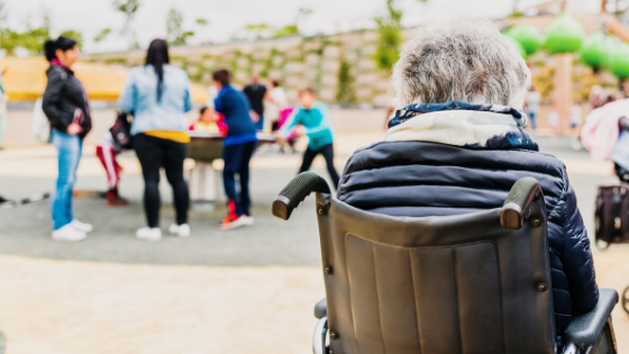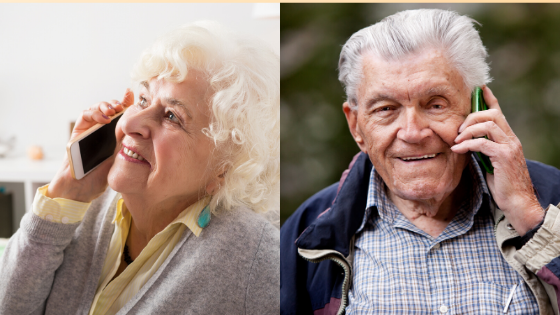|
Senior health studies show that social isolation is as important health as flattening the Corona-19 virus infection curve in seniors.
OPINION: It’s Time to Flatten the Loneliness Curve for Older Americans, by Marc Freedman and John Gomperts, was published in Next Avenue, April 20, 2020. The article discusses the impact of social isolation on elder health. This factor was an issue before Covid-19. However, the quarantine has made their social isolation even worse. The article references other countries’ methods of recognizing and responding to social isolation and encouraging elder social engagement. It offers several possible methods to facilitate the development of programs in the USA as engines to promote a better quality of life for seniors and for society in general. Did you know that grants were made last year to develop a Social Isolation Task Force and create a public education program? These grants were offered to all the state agencies that operate under the mandate of The Older Americans Act. I was on one of those task forces in my state. The assumption was the public wasn’t aware of the magnitude of social isolation amongst elders. Another assumption was the public wasn’t aware of the effects of social isolation on senior health and cost of care. Covid-19 changed all that. We‘ve all had a crash course in the experience of social isolation: the Stay-at-Home orders. We’ve seen people reacting, sometimes threatening violence, in a push-back against such measures. Children have suffered socially, emotionally and in their education as a result of being isolated from friends and school. To combat Covid-19, social isolation was one of the few measures we could employ. While we intended to combat the virus with isolation, we didn’t intend to isolate elders before Covid-19. Our society’s systems just didn’t address elder social isolation. Our society did not face social isolation before because of three factors; our original population, our history, and our lack of a collective memory experience. Our population was largely imported, usually young adults and their children. Later, they might send for the elders in the old country, or not. A sea voyage could be quite stressful on an older person. Thus, young people settled here. Later, another generation of young people left for the next new frontier. Our history shows that elders were left behind; again, and again. As a result, our focus was a succession of new frontiers. The USA never developed a role or task for elders. Today, our old frontier is closed. It’s time to bring society into the new social frontier: one in which we recognize we are a multi-generational country. There are gifts from each generation. We need to develop a role, and a function that recognizes the value of elders: a living history, perspective and experience. We also lack a collective memory of the elder’s journey. We all remember things from our childhood; many of us may not “remember” things from our elder hood; unless we have made that journey ourselves. Society hadn’t experienced certain aspects of aging, like social isolation, until now. We should view stay-at-home orders as our chance to learn what life is like for seniors who are forced to stay-at-home. What puts elders in that position? Their health may not permit frequent trips outside the home. Other elders are trapped at home because they can no longer drive. Public transportation may be too infrequent, too strenuous, or non-existent. Some elders find that vision or hearing problems interfere with socializing. We have few forums in which all generations come together. Religious institutions fill some of that gap but they can’t cover all the bases. Our neighborhoods are often age-segregated. Schools group children into smaller age cohorts: this is not the era of the all-ages, one-room school house. We build age-segregated housing only for elders. How is anyone to learn about the elder journey if our opportunity for observation and interaction are taken away? Covid-19 has given us a gift in disguise; we all shared some of the elders’ social isolation predicament. We reacted vehemently to these restrictions on ourselves. Now we know what they feel. The recommendations made in this article should be implemented. Let’s learn from this. As the old song says; ”Someday, some d-a-a-y, we’ll be together. Yes we will, yes we will...”
0 Comments
Has this happened to you? “I took groceries to my Mom. She wanted have coffee with me. I’ve tried to tell her I couldn’t, but she just doesn’t get it! I don’t know what to do”!
Caregiving is a demanding process and Covid-19 adds more demands. Caregivers still try to respond to their loved ones even under new circumstances. In the past, the caregiver could might take the elder shopping; not now. Shopping was an outing, a chance to socialize, and a chance for the caregiver to assess how the elder was doing. Now, we wear masks and are encouraged to shop as quickly: a-l-o-n-e. We only have a fleeting glance at our loved one on food drop-off. We can’t just pop in the house or care facility to check on things for ourselves. We must rely on reports from our loved one, the staff or (sometimes) the news. Imagine reading the news and learning your parent’s facility has a Covid-19 outbreak! Caregivers revealed they felt guilty before, it’s especially true now. Some guilt seems to be rooted in the feeling, “I can’t do anything!” Yes, you can. Caregivers used to worry about elders taking medicine properly or eating regularly; now worries include possible exposure, illness & death. To add to these concerns, seniors seem to want more from the caregivers. They ask caregivers to run more errands or ask for things not appropriate to their diet or welfare. An elder asked me to try to take money out of an ATM with his bank card! Why are elders making more or different or even illegal requests? There are a couple reasons. First, caregivers make the distinction between the Covid-19 as the cause and the changes in our lives as the response. Sometimes, that distinction is not as clear to the elder. “They just don’t get it”; is a sign to caregivers that the senior hasn’t understood in the first place. Everybody has studied something that felt very different when actually experiencing it. Think of your first time behind the wheel of a car. No instruction manual prepared you for that feeling of your foot on the accelerator. Childbirth classes help, but they can’t communicate what it feels like to give birth to a child. After the experience, we “got it”. Making it real,related to the senior’s early experiences, helps them to “get it”. Second, caregivers understand the impact of this pandemic process. So, instead of doing more errands, we need to take the time to help seniors grasp the process. We feel guilty because we can’t take them out, or can’t give them a hug. So, when they ask for more and more, we do it because it makes us feel better. Have you noticed that more errands just aren’t enough? That’s because errands don’t fill the senior’s real need: finding meaning and support. A conversation, in which you focus on their early experiences, such as quarantine, helps them feel the reality of current circumstances. Explanations don’t work as well as a trip down memory lane. Just making the effort to help them understand the experience will fill their need for direction and support from you. Your senior relies on you in ways they can’t express. When they feel like the world has gone crazy, they look to you. When you show effort to help them understand (not expertise) they become calmer and you’ll feel better too. Third, just saying NO, puts limits into their lives and is another way to calm your senior. When times are uncertain, a clear guide creates a sense of stability. They sense that you are looking out for them and you are their leader through these times. Your firm guidance gives them clarity. Then, you have more time and the emotional space to feel less guilty. Caregivers need not do e-v-e-r-y-t-h-i-n-g; just the right things. Fourth, a rule of thumb for elders with dementia is; the more dementia, the longer “emotional antennae”. Your seniors are highly attuned to your moods. They just can’t process the information the way they used to. Covid has shifted everyone’s life. Elders sense that you are struggling to adjust your lifestyle. Caregivers may not want to show these struggles. They feel guilty these the elders depend on their care. The elders already know. When you put words on your feelings, it’s like putting on an oven mitt; now you can handle hot stuff. Your words become the elder’s way to express their own feelings. Keep it simple but keep sharing. Remind them of any major adjustments they had to make in the past: WWII rationing, Great Depression job losses. Emphasize how they made it through hard times and the example they were to you. Thus, the caregiver becomes the mirror that reflects the senior back to their best self. Finally, remind the elder this is only for now, it will not last forever. As the old song says: “Some day; s-o-m-e-d-a-y, we’ll be together (yes we will)! |
Author "A Senior Moment" is written by Ms. Sara Lieber, owner of Senior Sidekicks. Ms. Lieber has over 30 years of experience in senior care. Archives
March 2024
Categories
All
|



 RSS Feed
RSS Feed